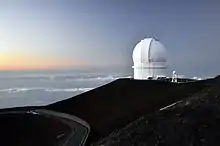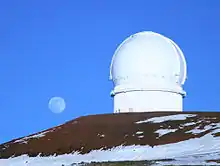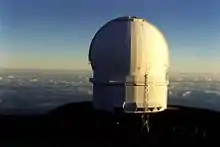Canada–France–Hawaii Telescope
The Canada–France–Hawaii Telescope (CFHT) is located near the summit of Mauna Kea mountain on Hawaii's Big Island at an altitude of 4,204 meters (13,793 feet), part of the Mauna Kea Observatory. Operational since 1979,[1] the telescope is a Prime Focus/Cassegrain configuration with a usable aperture diameter of 3.58 metres (11.7 ft).
 | |
| Alternative names | CFHT,Canada–France–Hawaii Telescope |
|---|---|
| Part of | Mauna Kea Observatories |
| Location(s) | Hawaii County, Hawaii |
| Coordinates | 19°49′31″N 155°28′12″W |
| Organization | French National Centre for Scientific Research National Research Council Canada University of Hawaiʻi at Mānoa |
| Altitude | 4,204 m (13,793 ft) |
| Telescope style | astronomical observatory optical telescope |
 Location of Canada–France–Hawaii Telescope | |
CFHT currently planning a refurbishment to the facility in the 2020s. The facility will be reconstructed with a new 11-m telescope to produce the Maunakea Spectroscopic Explorer, retaining the same base building and infrastructure. First light is expected in 2029.
Funding
The corporation is bound by a tripartite agreement between the University of Hawaii at Manoa, in the United States, the National Research Council (NRC) in Canada and the Centre National de la Recherche Scientifique (CNRS) in France. CFHT also has partnerships with the National Astronomical Observatory of China (NAOC), the Academia Sinica Institute of Astronomy and Astrophysics (ASIAA) in Taiwan, the National Laboratory of Astrophysics (LNA) in Brazil and the Korea Astronomy and Space Science Institute (KASI) in Korea. The contributions from these associate partners help fund CFHT's future instrumentation. Currently, CFHT observing time is offered to scientists from all the seven countries in the partnership. Astronomers from the European Union can also submit proposals through the Optical Infrared Coordination Network for Astronomy (OPTICON) access program.
Instruments
CFHT currently operates four instruments:
- MegaCam,[2] a one square degree field high-resolution CCD mosaic of 40 CCDs totalling 378 megapixels.
- WIRCam,[3] an infrared mosaic of 4 detectors totalling 16 megapixels, optimized for the J, H, and K spectral bands.[4]
- ESPaDOnS,[5] an echelle spectrograph/spectropolarimeter.
- SITELLE, a wide-field Fourier transform spectrograph[6]
- SPIRou, a near-infrared spectropolarimeter.
Outreach
CFHT, in collaboration with Coelum Astronomia, maintains a public-outreach website called "Hawaiian Starlight"[7] which offers extremely high-quality versions of CFHT images in various formats including a yearly calendar.
Gallery
 CFHT with moon in the background |
 CFHT in the morning |
 The telescope in August 2002 |
References
- Canada France Hawaii Telescope
- MegaCam paper on ADS
- WIRCam paper on ADS
- "Relay optics to correct telescope aberrations and widen the usual field-of-view". Archived from the original on 2012-07-31. Retrieved 2012-02-01.
- ESPaDOnS paper on ADS
- "SITELLE Home Page". www.cfht.hawaii.edu (in French). Retrieved 2017-12-30.
- "Hawaiian Starlight Film - Exploring the Universe from Mauna Kea - CFHT's Official Site". www.cfht.hawaii.edu. Retrieved 2017-12-30.
External links
| Wikimedia Commons has media related to Canada-France-Hawaii Telescope. |
- The Canada–France–Hawaii Telescope Corporation (official site)
- Hawaiian Starlight
- National Research Council (Canada)
- Centre National de la Recherche Scientifique (France)
- National Astronomical Observatories of China (China)
- ACADEMIA SINICA Institute of Astronomy and Astrophysics (Taiwan)
- Laboratório Nacional de Astrofisica (Brazil)
- Korean Space Science Institute (Korea)
- Coelum Astronomia
- WIRCAM optical configuration
- Optical Infrared Coordination Network for Astronomy (OPTICON)